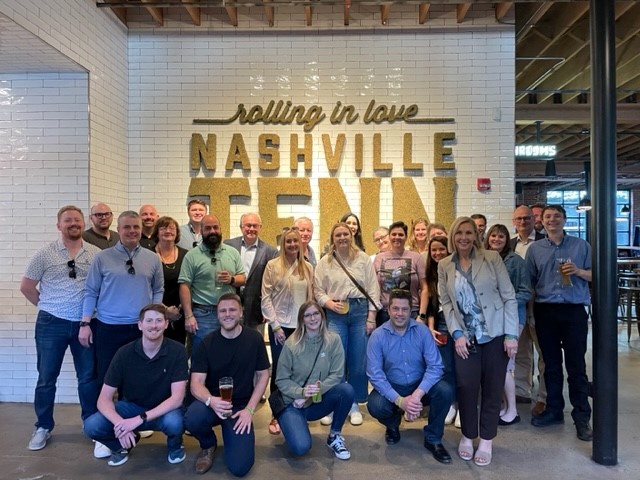AI and Data in Healthcare: Real-World Examples and Outcomes
The Crucial Conversations series provides dynamic opportunity for participants to hear diverse perspectives and insights from an expert panel with varying vantage points. Attendees also participate in collaborative discussion on what they understood, share their own unique perspective and talk about ways we could collectively address challenges and opportunities in care moving forward. Through curated small group conversations, participants in these sessions unpack the complexity of our industry and think about realistic steps that can be taken to make improvements, even incremental ones.
AI and Data in Healthcare: Real-World Examples and Outcomes
In our recent AI is Nothing Without Data Crucial Conversation our expert panel, comprised of Sherri Zink, SVP & Chief Data Engineer, BCBST, Dr. Lynn Simon, President, Healthcare Innovation & Chief Medical Officer, CHS and Tammy Hawes, Founder & CEO, Virsys12, moderated by Amy Deaton, President and COO of EvidenceCare, discussed real world implications and their unique perspectives. They explored how AI and data integration are transforming healthcare by sharing specific examples of AI applications, outcomes, and valuable lessons learned.
Automating Workflow with AI
Tammy Hawes, Founder & CEO, Virsys12, highlighted that since they do not handle clinical patient data, their focus is on automating workflows. This approach simplifies operations to enhance accuracy, speed and efficiency. For example, issues with provider profile data can cause considerable problems for members and patients. She noted their tools can predict up to 90% of potential errors in a specific provider's records, which significantly improves data quality and reduces issues for patients. Tammy noted the volume of data needed is massive, making synergy of scale critical to success.
Key Takeaways:
- The more data, the better. Large datasets improve AI accuracy but require significant processing power.
- Unlike traditional software, AI's accuracy improves with more data and processing, challenging the notion of synergy of scale in technology development.
Enhancing Patient Engagements with AI
Sherri Zink, SVP & Chief Data Engineer, BCBST discussed how AI is leveraged to support clinical care managers and customer service agents. She highlighted the importance of not only understanding the kind of the claims information that's coming in, but also the integration with the clinical record that's coming from the provider. Because in a lot of situations, especially for people with multiple comorbidities, they're dealing with various healthcare providers. there could be social factors that are surrounding them that may prohibit or inhibit their ability to get the right health care that they need, or to be able to execute on the health care plan that the provider has given them. So one of the other areas that we've used AI is around social determinants of health or social drivers of health, so that we can ensures a holistic approach to patient care.
Key Takeaways:
- AI algorithms improve with more diverse data inputs, including social determinants of health, which can affect a patient's ability to follow healthcare plans.
- Natural language processing (NLP) helps extract valuable insights from unstructured data, enhancing predictive analytics and personalized care.
Provider Perspective: AI in Maternal Health and Call Centers
On the provider side, Dr. Lynn Simon, President, Healthcare Innovation & Chief Medical Officer, CHS, explained AI implementation in OB suites since 2020 has shown positive outcomes. AI systems monitor maternal hypertension and fetal heart tracings, alerting care teams to necessary interventions. This leads to faster response times and better maternal and fetal health outcomes.
Additionally, AI is being used to automate their physician call center, which handles around 8 million calls annually. By analyzing call data, they are developing bots to handle tasks which will eventually result in confirming, canceling, and scheduling appointments, improving efficiency and patient experience.
Key Takeaways:
- AI can significantly improve clinical outcomes by enabling timely interventions based on predictive analytics.
- Automation of routine tasks in call centers frees up human resources for more complex patient interactions.
People Approach to AI and Data
The expert panel underscored the transformative potential of AI in healthcare with people at the forefront. From automating workflows and enhancing patient engagement to improving clinical outcomes and operational efficiency, AI applications are varied and impactful. However, the success of these initiatives relies heavily on:
- quality and integration of data
- continuous learning from real-world applications
- focus on the human aspects of AI deployment
As the healthcare industry continues to embrace AI, ongoing collaboration and innovation will be crucial in addressing the challenges and maximizing the benefits of these advanced technologies.
In our next "AI is Nothing without Data" Crucial Conversations recap we will dig into how socio technical factors such as user training, organizational culture, and technology infrastructure influence the success of AI initiatives with our expert panel: Sherri Zink, SVP & Chief Data Engineer, BCBST, Dr. Lynn Simon, President, Healthcare Innovation & Chief Medical Officer, CHS and Tammy Hawes, Founder & CEO, Virsys12, moderated by Amy Deaton, President and COO of EvidenceCare.
Join the Next Installment in the Nashville Health Care Council's Crucial Conversations Series
The conversations continue November 13, 2024 on the crucial topic of workforce. Members of the Nashville Health Care Council can register today. Not yet a member? Join our experienced and robust ecosystem of healthcare leaders.
The Nashville Health Care Council strengthens and elevates Nashville as the Healthcare City. With a $68 billion economic impact and 333,000 jobs locally, Nashville’s healthcare ecosystem is a world-class healthcare hub. Founded in 1995, the Council serves as the common ground for the city’s vibrant healthcare cluster. The Council offers engagement opportunities where the industry’s most influential executives come together to exchange ideas, share solutions, build businesses, and grow leaders.


